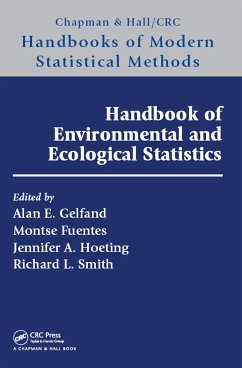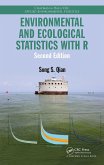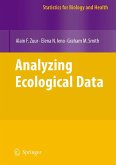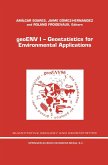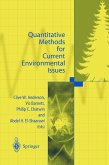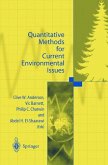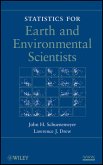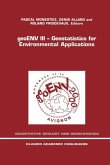Handbook of Environmental and Ecological Statistics
Herausgeber: Gelfand, Alan E.; Hoeting, Jennifer A.; Fuentes, Montserrat
Handbook of Environmental and Ecological Statistics
Herausgeber: Gelfand, Alan E.; Hoeting, Jennifer A.; Fuentes, Montserrat
- Gebundenes Buch
- Merkliste
- Auf die Merkliste
- Bewerten Bewerten
- Teilen
- Produkt teilen
- Produkterinnerung
- Produkterinnerung
This handbook focuses on the enormous literature applying statistical methodology and modelling to environmental and ecological processes.
Andere Kunden interessierten sich auch für
![Environmental and Ecological Statistics with R Environmental and Ecological Statistics with R]() Song S QianEnvironmental and Ecological Statistics with R132,99 €
Song S QianEnvironmental and Ecological Statistics with R132,99 €![Analyzing Ecological Data Analyzing Ecological Data]() Alain ZuurAnalyzing Ecological Data194,99 €
Alain ZuurAnalyzing Ecological Data194,99 €![Geoenv I -- Geostatistics for Environmental Applications Geoenv I -- Geostatistics for Environmental Applications]() SoaresGeoenv I -- Geostatistics for Environmental Applications250,99 €
SoaresGeoenv I -- Geostatistics for Environmental Applications250,99 €![Quantitative Methods for Current Environmental Issues Quantitative Methods for Current Environmental Issues]() Clive W. Anderson / Vic Barnett / Philip C. Chatwin / Abdel H. El-Shaarawi (eds.)Quantitative Methods for Current Environmental Issues113,99 €
Clive W. Anderson / Vic Barnett / Philip C. Chatwin / Abdel H. El-Shaarawi (eds.)Quantitative Methods for Current Environmental Issues113,99 €![Quantitative Methods for Current Environmental Issues Quantitative Methods for Current Environmental Issues]() Quantitative Methods for Current Environmental Issues42,99 €
Quantitative Methods for Current Environmental Issues42,99 €![Statistics for Earth and Environmental Scientists Statistics for Earth and Environmental Scientists]() John H SchuenemeyerStatistics for Earth and Environmental Scientists161,99 €
John H SchuenemeyerStatistics for Earth and Environmental Scientists161,99 €![geoENV III ¿ Geostatistics for Environmental Applications geoENV III ¿ Geostatistics for Environmental Applications]() Pascal Monestiez / Denis Allard / Roland Froidevaux (Hgg.)geoENV III ¿ Geostatistics for Environmental Applications161,99 €
Pascal Monestiez / Denis Allard / Roland Froidevaux (Hgg.)geoENV III ¿ Geostatistics for Environmental Applications161,99 €-
-
-
This handbook focuses on the enormous literature applying statistical methodology and modelling to environmental and ecological processes.
Hinweis: Dieser Artikel kann nur an eine deutsche Lieferadresse ausgeliefert werden.
Hinweis: Dieser Artikel kann nur an eine deutsche Lieferadresse ausgeliefert werden.
Produktdetails
- Produktdetails
- Verlag: Chapman and Hall/CRC
- Seitenzahl: 878
- Erscheinungstermin: 11. Februar 2019
- Englisch
- Abmessung: 260mm x 183mm x 51mm
- Gewicht: 1813g
- ISBN-13: 9781498752022
- ISBN-10: 1498752020
- Artikelnr.: 55864055
- Herstellerkennzeichnung
- Libri GmbH
- Europaallee 1
- 36244 Bad Hersfeld
- gpsr@libri.de
- Verlag: Chapman and Hall/CRC
- Seitenzahl: 878
- Erscheinungstermin: 11. Februar 2019
- Englisch
- Abmessung: 260mm x 183mm x 51mm
- Gewicht: 1813g
- ISBN-13: 9781498752022
- ISBN-10: 1498752020
- Artikelnr.: 55864055
- Herstellerkennzeichnung
- Libri GmbH
- Europaallee 1
- 36244 Bad Hersfeld
- gpsr@libri.de
Alan E. Gelfand is the James B. Duke Professor of Statistical Science at Duke University. He is a leader in Bayesian spatial modeling and analysis including a successful book in this area with Banerjee and Carlin. Montserrat (Montse) Fuentes, Ph.D., became dean of the Virginia Commonwealth University College of Humanities and Sciences on July 1, 2016. She came to VCU from North Carolina State University, where she served as the head of the Department of Statistics and James M. Goodnight Distinguished Professor of Statistics. She also served as center director for the Research Network for Statistical Methods for Atmospheric and Oceanic Sciences, a research collaborative funded by the National Science Foundation. She received a dual bachelor's degree in mathematics and music (piano) from the University of Valladolid in Spain and a Ph.D. in statistics from the University of Chicago. Jennifer A. Hoeting is a Professor of Statistics at Colorado State University, where she has worked since 1994. She received her PhD from the University of Washington. Richard L. Smith is Mark L. Reed III Distinguished Professor of Statistics and Professor of Biostatistics in the University of North Carolina, Chapel Hill. From 2010-2017 he was also Director of the Statistical and Applied Mathematical Sciences Institute, a Mathematical Sciences Institute supported by the National Science Foundation, and he will continue (through June 2018) as Associate Director of SAMSI. He obtained his PhD from Cornell University and previously held academic positions at Imperial College (London), the University of Surrey (Guildford, England) and Cambridge University. His main research interest is environmental statistics and associated areas of methodological research such as spatial statistics, time series analysis and extreme value theory. He is particularly interested in statistical aspects of climate change research, and in air pollution including its health effects. He is a Fellow of the American Statistical Association and the Institute of Mathematical Statistics, an Elected Member of the International Statistical Institute, and has won the Guy Medal in Silver of the Royal Statistical Society, and the Distinguished Achievement Medal of the Section on Statistics and the Environment, American Statistical Association. In 2004 he was the J. Stuart Hunter Lecturer of The International Environmetrics Society (TIES). He is also a Chartered Statistician of the Royal Statistical Society.
Introduction. Methodology for Statistical Analysis of Environmental
Processes. Basics of modeling for environmental processes. Time series
methodology. Dynamic models. Geostatistical modeling for environmental
processes. Point patterns. Data fusion. Analysis of Extremes. Environmental
sampling methods. Zero-inflation modeling and hurdle models. Ordination
methods. Topics in Ecological Processes. Species distribution models -
Plants. Species distribution models - Animals. Demography. Modeling traits.
Ecology of infectious diseases. Wildfires and fire recovery. Modeling of
streams. Topics in Environmental Exposure. Modeling environmental
contaminants. Data fusion for exposure. Modeling other exposures and
modeling personal exposure. Preferential sampling with regard to exposure
levels. Dynamic source apportionment. Dynamics of environmental
epidemiology. Connecting exposure to outcome. Experimental design for
environmental epidemiology. Topics in Climatology. Trends in climatology.
Climate models. Spatial analysis for climatology. Remote sensing - the
statistical contribution. Data assimilation. Spatial extremes with
application to climate and environmental exposure. Paleoclimate and
paleoecology. Detection and attribution. Effects of climate change on
health effects.
Processes. Basics of modeling for environmental processes. Time series
methodology. Dynamic models. Geostatistical modeling for environmental
processes. Point patterns. Data fusion. Analysis of Extremes. Environmental
sampling methods. Zero-inflation modeling and hurdle models. Ordination
methods. Topics in Ecological Processes. Species distribution models -
Plants. Species distribution models - Animals. Demography. Modeling traits.
Ecology of infectious diseases. Wildfires and fire recovery. Modeling of
streams. Topics in Environmental Exposure. Modeling environmental
contaminants. Data fusion for exposure. Modeling other exposures and
modeling personal exposure. Preferential sampling with regard to exposure
levels. Dynamic source apportionment. Dynamics of environmental
epidemiology. Connecting exposure to outcome. Experimental design for
environmental epidemiology. Topics in Climatology. Trends in climatology.
Climate models. Spatial analysis for climatology. Remote sensing - the
statistical contribution. Data assimilation. Spatial extremes with
application to climate and environmental exposure. Paleoclimate and
paleoecology. Detection and attribution. Effects of climate change on
health effects.
Introduction. Methodology for Statistical Analysis of Environmental
Processes. Basics of modeling for environmental processes. Time series
methodology. Dynamic models. Geostatistical modeling for environmental
processes. Point patterns. Data fusion. Analysis of Extremes. Environmental
sampling methods. Zero-inflation modeling and hurdle models. Ordination
methods. Topics in Ecological Processes. Species distribution models -
Plants. Species distribution models - Animals. Demography. Modeling traits.
Ecology of infectious diseases. Wildfires and fire recovery. Modeling of
streams. Topics in Environmental Exposure. Modeling environmental
contaminants. Data fusion for exposure. Modeling other exposures and
modeling personal exposure. Preferential sampling with regard to exposure
levels. Dynamic source apportionment. Dynamics of environmental
epidemiology. Connecting exposure to outcome. Experimental design for
environmental epidemiology. Topics in Climatology. Trends in climatology.
Climate models. Spatial analysis for climatology. Remote sensing - the
statistical contribution. Data assimilation. Spatial extremes with
application to climate and environmental exposure. Paleoclimate and
paleoecology. Detection and attribution. Effects of climate change on
health effects.
Processes. Basics of modeling for environmental processes. Time series
methodology. Dynamic models. Geostatistical modeling for environmental
processes. Point patterns. Data fusion. Analysis of Extremes. Environmental
sampling methods. Zero-inflation modeling and hurdle models. Ordination
methods. Topics in Ecological Processes. Species distribution models -
Plants. Species distribution models - Animals. Demography. Modeling traits.
Ecology of infectious diseases. Wildfires and fire recovery. Modeling of
streams. Topics in Environmental Exposure. Modeling environmental
contaminants. Data fusion for exposure. Modeling other exposures and
modeling personal exposure. Preferential sampling with regard to exposure
levels. Dynamic source apportionment. Dynamics of environmental
epidemiology. Connecting exposure to outcome. Experimental design for
environmental epidemiology. Topics in Climatology. Trends in climatology.
Climate models. Spatial analysis for climatology. Remote sensing - the
statistical contribution. Data assimilation. Spatial extremes with
application to climate and environmental exposure. Paleoclimate and
paleoecology. Detection and attribution. Effects of climate change on
health effects.

